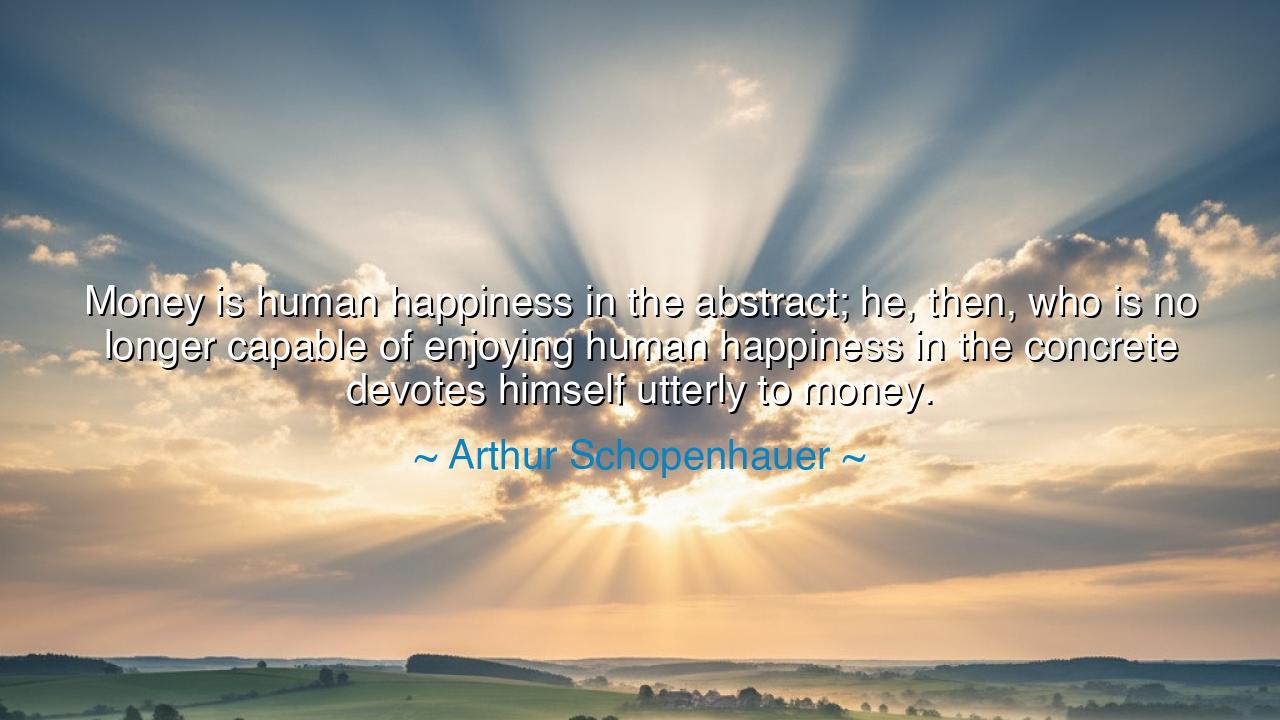
Money is human happiness in the abstract; he, then, who is no
Money is human happiness in the abstract; he, then, who is no longer capable of enjoying human happiness in the concrete devotes himself utterly to money.






In the voice of deep reflection, Arthur Schopenhauer, the philosopher of the will, once wrote: “Money is human happiness in the abstract; he, then, who is no longer capable of enjoying human happiness in the concrete devotes himself utterly to money.” These words, born from the heart of nineteenth-century Europe, still pierce the soul of modern humanity. Schopenhauer, ever the observer of mankind’s illusions, saw that money, though a symbol of power and comfort, becomes a false idol when the human spirit forgets how to rejoice in the living, breathing beauty of life itself. His words are not a condemnation of wealth, but a lament — for the tragedy of those who have replaced the fullness of experience with its pale imitation.
To Schopenhauer, money was the ultimate abstraction — a substitute for the real things that give life meaning: love, friendship, art, nature, and joy. Money has no substance in itself; it is a promise, a shadow, a token of potential pleasure. Yet, when men lose their ability to take delight in what is concrete — the laughter of a child, the warmth of the sun, the taste of bread, the music of companionship — they turn instead to the abstraction, seeking in coins and numbers what they can no longer feel in their souls. Thus the miser, though surrounded by wealth, lives in starvation; his riches are vast, but his spirit impoverished.
This truth has been revealed again and again through the ages. Consider the story of King Midas, who begged the gods that all he touched might turn to gold. At first, he rejoiced in his newfound power, but soon the joy turned to horror — for the bread he touched became metal, the wine became gold, and even his beloved daughter turned lifeless in his arms. Schopenhauer’s insight is the same in another form: he who devotes himself “utterly to money” loses the ability to enjoy human happiness in the concrete, and thus turns life itself into a cold and glittering tomb.
Yet Schopenhauer does not speak from hatred of material comfort, but from wisdom. He understood that happiness must be lived, not purchased. The man who finds joy in small things — in work done with purpose, in friendship, in the beauty of thought — is rich beyond measure, even if his purse is empty. But the one who lives only for accumulation becomes like a ghost among his treasures, forever hungry yet never nourished. Money may command comfort, but it cannot summon contentment. It may purchase pleasure, but not peace.
The philosopher’s warning resounds especially in our own age, when mankind chases wealth as though it were salvation. The world has grown skilled in producing abundance, yet poorer in spirit. Many work not to live, but live to work; they store up possessions but lose the capacity to feel delight. Like Schopenhauer’s “man of abstraction,” they confuse the symbol for the substance — mistaking the glitter of gold for the glow of life. True happiness, however, arises not from ownership, but from awareness: from being fully alive to the miracle of existence itself.
We may see the contrast clearly in the lives of two kinds of men. One spends his life amassing fortunes, fearing loss, guarding his wealth like a soldier before a vault. The other, though modest in means, delights in the company of friends, the labor of his hands, the quiet beauty of the evening sky. The first is chained to the abstract — imprisoned by numbers, haunted by the thought of “more.” The second walks free, his soul in harmony with the world. Who, then, is richer? Schopenhauer would say: the one who can still enjoy human happiness in the concrete, for his treasure is eternal and cannot be stolen.
Let this be the lesson passed down through time: money is a tool, not a master. It may sustain life, but it cannot give meaning to it. Seek not to measure your worth by what you own, but by what you can cherish. Cultivate the heart’s ability to find joy in simple things — in kindness, in truth, in the music of being. For when the soul forgets how to love the real, it begins to worship the unreal; when it ceases to rejoice in what is human, it becomes enslaved to what is hollow.
Thus, as Schopenhauer teaches, guard your spirit well. Use money wisely, but do not let it use you. For happiness, once abstracted into gold, loses its warmth; but when lived — when felt, when shared — it becomes the truest wealth a mortal can possess.






AAdministratorAdministrator
Welcome, honored guests. Please leave a comment, we will respond soon